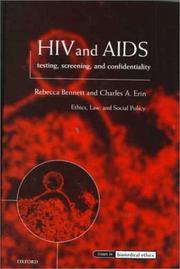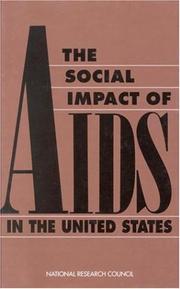| Listing 1 - 10 of 16 | << page >> |
Sort by
|
Book
Abstract | Keywords | Export | Availability | Bookmark
 Loading...
Loading...Choose an application
- Reference Manager
- EndNote
- RefWorks (Direct export to RefWorks)
Informed consent (Medical law) --- HIV antibodies --- AIDS Serodiagnosis --- Informed Consent --- Acquired Immunodeficiency Syndrome --- HIV Infections
Dissertation
ISBN: 9056510231 Year: 1995 Publisher: Delft Eburon
Abstract | Keywords | Export | Availability | Bookmark
 Loading...
Loading...Choose an application
- Reference Manager
- EndNote
- RefWorks (Direct export to RefWorks)
AIDS Serodiagnosis --- HIV Seropositivity --- Overdose --- Substance Abuse, Intravenous --- Suicide --- HIV Infections --- psychology --- mortality --- epidemiology --- Netherlands.
Book
Abstract | Keywords | Export | Availability | Bookmark
 Loading...
Loading...Choose an application
- Reference Manager
- EndNote
- RefWorks (Direct export to RefWorks)
AIDS SERODIAGNOSIS --- ACQUIRED IMMUNODEFICIENCY SYNDROME --- OPPORTUNISTIC INFECTIONS --- HEALTH MANPOWER --- DRUG THERAPY --- COMPLICATIONS --- PSYCHOLOGY --- TRANSMISSION
Book
Year: 1992 Publisher: Saint Louis, MO : Mosby Year Book,
Abstract | Keywords | Export | Availability | Bookmark
 Loading...
Loading...Choose an application
- Reference Manager
- EndNote
- RefWorks (Direct export to RefWorks)
ACQUIRED IMMUNODEFICIENCY SYNDROME --- HEALTH PERSONNEL --- AIDS SERODIAGNOSIS --- SURGERY, OPERATIVE --- HISTORY --- EPIDEMIOLOGY --- TRANSMISSION
Dissertation
Year: 1991 Publisher: Liège : Université de Liège. Faculté de médecine (ULg). Département de clinique et pathologie médicales,
Abstract | Keywords | Export | Availability | Bookmark
 Loading...
Loading...Choose an application
- Reference Manager
- EndNote
- RefWorks (Direct export to RefWorks)
ACQUIRED IMMUNODEFICIENCY SYNDROME --- COMMUNITY HEALTH CENTERS --- AIDS SERODIAGNOSIS --- PROGRAM EVALUATION --- BELGIUM
Book
ISBN: 9064641277 Year: 1999 Publisher: Place of publication unknown Hendriks
Abstract | Keywords | Export | Availability | Bookmark
 Loading...
Loading...Choose an application
- Reference Manager
- EndNote
- RefWorks (Direct export to RefWorks)
HIV Seropositivity --- HIV Seroprevalence. --- Acquired Immunodeficiency Syndrome --- HIV Infections --- Seroprevalence, HIV --- HIV Testing --- AIDS Serodiagnosis --- epidemiology. --- Semiology. Diagnosis. Symptomatology --- Infectious diseases. Communicable diseases --- HIV Seroprevalence --- epidemiology

ISBN: 0198238010 Year: 1999 Publisher: Oxford Oxford University Press
Abstract | Keywords | Export | Availability | Bookmark
 Loading...
Loading...Choose an application
- Reference Manager
- EndNote
- RefWorks (Direct export to RefWorks)
Testing and screening for HIV and AIDS give rise to ethical, legal, and social issues of the most controversial and delicate kind. An international team of eighteen doctors, philosophers, and lawyers present a fresh and thorough discussion of these issues; they aim to show the way to practical advances but also to give an accessible guide to the debates for readers new to them. The contributors pay particular attention to the sensitive nature of the information yielded by a test for HIV antibody. They consider such questions as these: Are we under an obligation to disclose our HIV status if known? Can there be a moral justfication for the breaching of confidentiality in certain circumstances? Should health care professionals be forced to undergo HIV testing? Is there a right to remain in ignorance of one's HIV status? Consideration of such questions illuminates not only public policy and medical practice in connection with HIV and AIDS, but also broader issues about professional ethics and individual rights in other medical and social contexts.The breadth and depth of the research represented and the lucidity of the arguments put forward make this a key resource for academic researchers and healthcare professionals alike.The late twentieth century has witnessed dramatic technological developments in biomedical science and the delivery of health care, and these developments have brought with them important social changes. All too often ethical analysis has lagged behind these changes. The purpose of this series is to provide lively, up-to-date, and authoritative studies for the increasingly large and diverse readership concerned with issues in biomedical ethics-not just health care trainees and professionals, but also social scientists, philosophers, lawyers, social workers, and legislators. The series will feature both single-author and multi-author books, short and accessible enough to be widely read, each of them focused on an issue of outstanding current importance and interest. Philosophers, doctors, and lawyers from several countries already feature among the contributors to the series.It promises to become the leading channel for the best original work in this burgeoning field. This text combines an international team of doctors, philosophers and lawyers to present a fresh and thorough discussion of the ethical, legal and social issues raised by testing and screening for HIV and AIDS.
Confidential communications --- HIV infections --- HIV Infections --- AIDS Serodiagnosis. --- Confidentiality. --- Ethics, Medical. --- Mass Screening. --- Physicians. --- Diagnosis --- Moral and ethical aspects. --- Social aspects. --- Law and legislation. --- diagnosis. --- aids (HIV) --- ethiek van het onderzoek (onderzoeksethiek) --- recht (wetgeving, rechtspraak, rechtsbeginselen, juridische aspecten, aansprakelijkheid) --- sociale context --- onderzoek --- Aids --- Medische ethiek --- sida (VIH) --- éthique de la recherche --- droit (aspects juridiques, législation, jurisprudence, principes de droit, responsabilité) --- context social --- recherche --- Sida --- Ethique médicale --- Aids serodiagnosis. --- Ethics, medical. --- Hiv infections --- Mass screening. --- Diagnosis. --- HIV (Viruses) infections --- HTLV-III infections --- HTLV-III-LAV infections --- Human T-lymphotropic virus III infections --- Doctor-patient privilege --- Patient-physician privilege --- Physician-patient privilege --- Physicians --- Diagnosis&delete& --- Moral and ethical aspects --- Social aspects --- Law and legislation --- Lentivirus infections --- Sexually transmitted diseases --- Medical ethics --- Medical laws and legislation
Book
ISSN: 10115781 ISBN: 9242210080 9789242210088 Year: 1991 Volume: 8 Publisher: Genève: Organisation mondiale de la santé,
Abstract | Keywords | Export | Availability | Bookmark
 Loading...
Loading...Choose an application
- Reference Manager
- EndNote
- RefWorks (Direct export to RefWorks)
AIDS --- AIDS (Disease) --- Acquired immune deficiency syndrome --- Acquired immunodeficiency syndrome --- Acquired immunological deficiency syndrome --- SIDA --- Acquired Immunodeficiency Syndrome --- HIV Infections --- prevention and control --- Aids --- prevention & control. --- psychology. --- Sida --- ACQUIRED IMMUNODEFICIENCY SYNDROME, prevention and control --- psychology --- Psychology. --- Acquired immunodeficiency syndrome, prevention and control --- Prevention --- AIDS Serodiagnosis. --- Patient Education as Topic. --- World Health Organization. --- PREVENTION AND CONTROL. --- prevention & control --- Acquired Immunodeficiency Syndrome - prevention and control --- HIV Infections - guidebooks - prevention and control --- Patient Education as Topic --- World Health Organization
Book
ISBN: 929061398X 9290614676 Year: 2009 Publisher: Manila : World Health Organization, Western Pacific Region,
Abstract | Keywords | Export | Availability | Bookmark
 Loading...
Loading...Choose an application
- Reference Manager
- EndNote
- RefWorks (Direct export to RefWorks)
This publication offers basic operational guidance on HIV testing and counseling in settings attended by people who inject drugs (PWID). It is intended for a wide audience, including policy-makers, HIV/AIDS programme planners and coordinators, care providers, nongovernmental organizations (NGOs) providing services for HIV-related conditions, and civil society groups. This is a joint publication of WHO (WPRO and SEARO) and UNODC (United Nations Office on Drugs and Crime, Regional Centre for East Asia and the Pacific). It is an additional instrument to allow people who use drugs to access health
HIV infections -- Diagnosis. --- HIV infections. --- HIV-positive persons -- Counseling of. --- HIV-positive persons. --- HIV infections --- Drugs --- Mental Health Services --- Lentivirus Infections --- Serologic Tests --- Immunologic Deficiency Syndromes --- Psychology, Applied --- Sexually Transmitted Diseases, Viral --- Substance-Related Disorders --- Community Health Services --- Counseling --- HIV Infections --- AIDS Serodiagnosis --- Substance Abuse, Intravenous --- Sexually Transmitted Diseases --- Health Services --- Behavioral Disciplines and Activities --- Diseases --- Immunologic Tests --- Mental Disorders --- Retroviridae Infections --- Immune System Diseases --- Psychological Phenomena and Processes --- Psychiatry and Psychology --- Laboratory Techniques and Procedures --- Health Care Facilities, Manpower, and Services --- Immunologic Techniques --- Virus Diseases --- RNA Virus Infections --- Health Care --- Diagnosis --- Investigative Techniques --- Analytical, Diagnostic and Therapeutic Techniques and Equipment --- Public Health --- Communicable Diseases --- Health & Biological Sciences --- HIV-positive persons --- Diagnosis. --- Counseling of. --- HIV-infected persons --- HIV patients --- HIV-sero-positive persons --- HIV-seropositive persons --- People living with HIV/AIDS --- Positive persons, HIV --- -Sero-positive persons, HIV --- -Seropositive persons, HIV --- -HIV (Viruses) infections --- HTLV-III infections --- HTLV-III-LAV infections --- Human T-lymphotropic virus III infections --- Patients --- -Patients --- HIV (Viruses) infections --- Lentivirus infections --- Sexually transmitted diseases

ISBN: 0309046289 9786610203451 1280203455 0309583861 0585024138 9780585024134 6610203458 9780309046282 Year: 1993 Publisher: Washington, D.C. National Academy Press
Abstract | Keywords | Export | Availability | Bookmark
 Loading...
Loading...Choose an application
- Reference Manager
- EndNote
- RefWorks (Direct export to RefWorks)
MEDICAL --- AIDS & HIV --- AIDS (Disease) --- Religion --- Confidentiality --- Contact Tracing --- Delivery of Health Care --- Government --- Sociology, Medical --- Public Health --- Health Personnel --- Patient Care --- Financial Support --- Homosexuality --- Social Control, Formal --- State Government --- Economics --- Family Relations --- Public Policy --- Social Change --- Acquired Immunodeficiency Syndrome --- AIDS Serodiagnosis --- Epidemiology --- HIV Seropositivity --- Federal Government --- Government Regulation --- Human Experimentation --- Local Government --- Pharmaceutical Preparations --- Coercion --- Duty to Warn --- Mandatory Programs --- Prisoners --- Infant, Newborn --- Social Problems --- Politics --- Social Welfare --- Child --- Jurisprudence --- Patient Advocacy --- Health Facilities --- Quarantine --- Health --- Occupational Groups --- Sexuality --- Age Groups --- HIV Infections --- Research --- Organizations --- Sociology --- Forensic Psychiatry --- Epidemiologic Methods --- Persons --- Therapeutics --- Social Control Policies --- Health Care Facilities, Manpower, and Services --- Socioeconomic Factors --- Serologic Tests --- Infant --- Organization and Administration --- Patient Care Management --- Humanities --- Investigative Techniques --- Family --- Truth Disclosure --- Infection Control --- Medicine --- Patient Rights --- Health Services --- Health Care Quality, Access, and Evaluation --- Environment and Public Health --- Biomedical Research --- Communicable Disease Control --- Health Care Economics and Organizations --- Chemicals and Drugs --- Health Occupations --- Social Control, Informal --- Slow Virus Diseases --- Social Sciences --- Population Characteristics --- Health Care --- Analytical, Diagnostic and Therapeutic Techniques and Equipment --- Health Services Administration --- Immunologic Tests --- Disciplines and Occupations --- Science --- Named Groups --- Sexually Transmitted Diseases, Viral --- Anthropology, Education, Sociology and Social Phenomena --- Human Rights --- Lentivirus Infections --- Psychiatry --- Immunologic Deficiency Syndromes --- Reproductive Physiological Phenomena --- Virus Diseases --- Disclosure --- Sexual Behavior --- Policy --- Public Health Practice --- Psychology, Social --- Behavioral Sciences --- Communication --- Diseases --- Immune System Diseases --- Behavior and Behavior Mechanisms --- Retroviridae Infections --- Sexually Transmitted Diseases --- Laboratory Techniques and Procedures --- Natural Science Disciplines --- Reproductive and Urinary Physiological Phenomena --- Behavior --- Immunologic Techniques --- Psychiatry and Psychology --- Diagnosis --- Phenomena and Processes --- RNA Virus Infections --- Behavioral Disciplines and Activities --- Communicable Diseases --- Health & Biological Sciences --- Social aspects --- #SBIB:316.334.3M20 --- #SBIB:316.334.3M50 --- #SBIB:35H436 --- #SBIB:35H6030 --- Sociale epidemiologie en etiologie: sociale aspecten van ziekte en gezondheid --- Organisatie van de gezondheidszorg: algemeen, beleid --- Beleidssectoren: welzijn, volksgezondheid en cultuur --- Bestuur en beleid: nationale en regionale studies: Verenigde Staten --- United States
| Listing 1 - 10 of 16 | << page >> |
Sort by
|

 Search
Search Feedback
Feedback About UniCat
About UniCat  Help
Help News
News